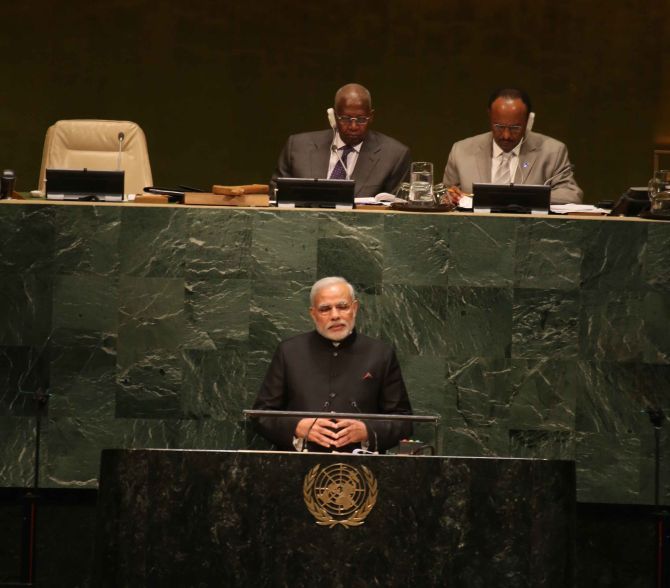'Human rights issues continue to be exploited selectively, more often for narrow short-term political ends,' Modi tells Ban.

Prime Minister Narendra Modi will be one of the world leaders addressing the summit to adopt the Post-2015 development agenda, to be held September 25 to 28, as part of the 70th United Nations General Assembly.
Ambassador Asoke Kumar Mukerji, India's Permanent Representative to the UN, said that unlike in the case of the Millennium Development Goals, this new agenda called for a bottom-up approach, with inputs being sought from members of civil society, academics, students, corporations and media.
"India seeks a time-bound way to meet the SDGs (Sustainable Development Goals). The focus will be on implementing SDGs, not on what they mean," Ambassador Mukerji told the media at the Indian Permanent Mission in New York, September 17.
The goals address such fundamental issues as working towards ending hunger, improving health, sustaining the planet, and ensuring peace, relying on the participation of all countries.
Ambassador Mukerji pointed out that India has set its own internal goals -- by October 2, 2019 to have seven million toilets to ensure better sanitation, and to ensure potable water for all, and by 2022 to generate 100GW of energy through solar power.
India's agenda for the 70th General Assembly include reform of the UN Security Council (possibly to include more the five permanent members), addressing the post-2015 agenda, ensuring international security, confirming its commitment to peacekeeping operations with the consent of all parties and avoiding attack except in defence, and its resolve to fight terrorism. It will also focus on human rights, and seek a calculated reduction in nuclear weapons over time.
Permanent Representative Mukerji described the letter Modi had written to UN Secretary-General Ban Ki-moon, stressing that removing poverty should be the main focus of the post-2015 development agenda.
Modi's letter spoke of the hope that India put on Digital India, which would target benefits to the needy, make service delivery more efficient, increase civilian participation in governance, and ensure financial inclusion and empowerment of citizens.
On the issue of human rights, Modi's letter said 'human rights issues continue to be exploited selectively, more often for narrow short-term political ends.' It added that that while civil and political rights were of prime importance, so were economic, social and cultural rights and the right to development.
'We should utilise the opportunity presented by the 70th anniversary of the United Nations to change this paradigm fundamentally, and usher in a new one that seeks to promote all human rights everywhere,' Modi's letter said.
The prime minister enclosed with his letter to Ban commemorative stamps and coins commissioned on June 21, the First International Yoga Day.
IMAGE: Prime Minister Narendra Modi at the United Nations last year. Photograph: Paresh Gandhi/Rediff.com











 © 2025
© 2025